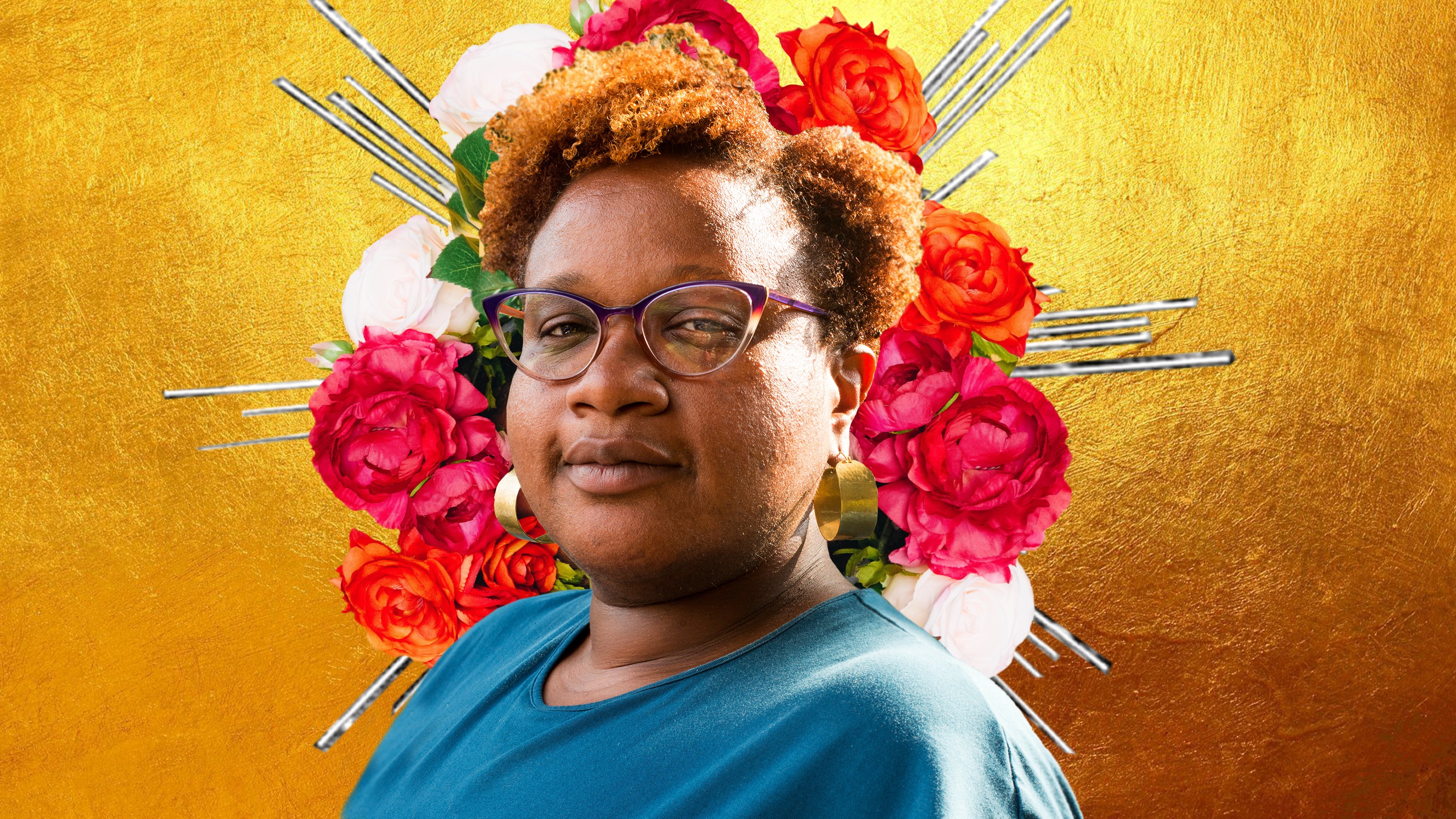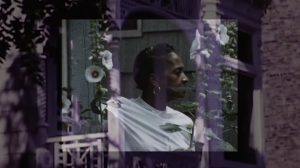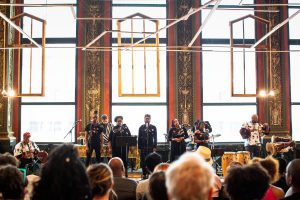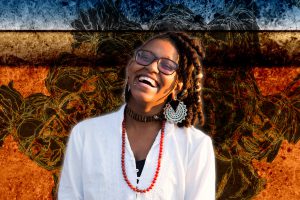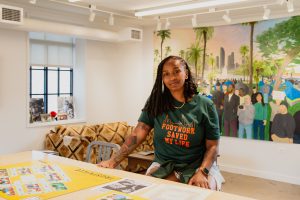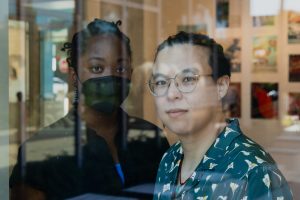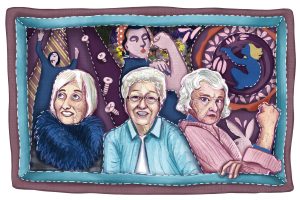Erin Glasco (her/hers; they/them) is an archivist and organizer based in Chicago. They have worked on archival projects with Free Street Theatre, the Chicago History Museum, and a Studs Turkel podcast project with WFMT Chicago and Eve Ewing. Additionally, they are currently a part of No Cop Academy, an effort led by Black youth in Chicago to demand $95 million for youth and communities, instead of a new facility for Chicago police. They received their Master’s in Library Science from UIC-UC and currently work as a Visiting Instructor and Special Collections Librarian at UIC.
I first met Erin at the Center for Black Music Research (CBMR) as a Journalism undergrad at Columbia College Chicago. They were studying the Paul Robeson FBI files while I was studying ethnomusicology and the interconnectedness of Jamaican Dancehall music within Black American Hip Hop culture. I was astounded by how familiar Erin’s presence felt. Immediately, we were joking and laughing as if we were old college friends. Since 2014, our friendship has strengthened and our careers have aligned and intersected in many ways. Whether it is organizing an outreach event or showing up for a political action in the dead of winter, they always bring their full self to any table, space, or dance floor they occupy. Their vision of what justice, liberation and community looks and feels like is refreshing and deeply enriching.
This interview was edited for clarity and length.
Ireashia Bennett (IB): So, what drew you to the archives and how does it nourish and inspire you intellectually, emotionally, creatively or otherwise?
Erin Glasco (EG): Before I can talk about what drew me to the archives, it’s important for me to talk about where I came from. It’s been a journey to get to the archives. I didn’t initially start in archives. I have a Business degree and that was the trajectory of my life until 2014. I was working for the Federal Government as a Bank Regulator. It was a job I hated. But, I fell into the myth of wanting to have a job that felt secure–that I could always sort of depend on. So, I did that for a number of years. So, I was really fortunate—extremely fortunate, actually—to be in a financial position where it was possible for me to quit my job. I’m very thankful for where I am now, but I also recognize that the financial circumstances existed so I could make the switch.
So, I started thinking about what I wanted to do and sort of landed on archives. And, I literally just Googled: “What are good jobs for people who love books and history?” That’s how I initially came to the archives. In 2014, that was the sort of genesis for the movement for Black Lives and I was really trying to think critically about the work that I wanted to do. And, I noticed in archives they seemed to have this really vibrant, social justice community that really spoke to me at the time. So, I thought: “Okay, I can finally do something that aligns with some things I’m interested in sort of organically,” but also give me a chance to be involved in movement work perhaps. Or, at least a movement within archives that is really trying to strive for so many things but certainly a different archival standard that we have today. So, I was really drawn to that.
I’m certainly not the same person I was four years ago. I feel like it’s lovely that I found a job that was also able to grow with me and that it still speaks to the person I am today. It’s really important for folks to have access to information, and getting involved in the information science world gives me a place for foundation.
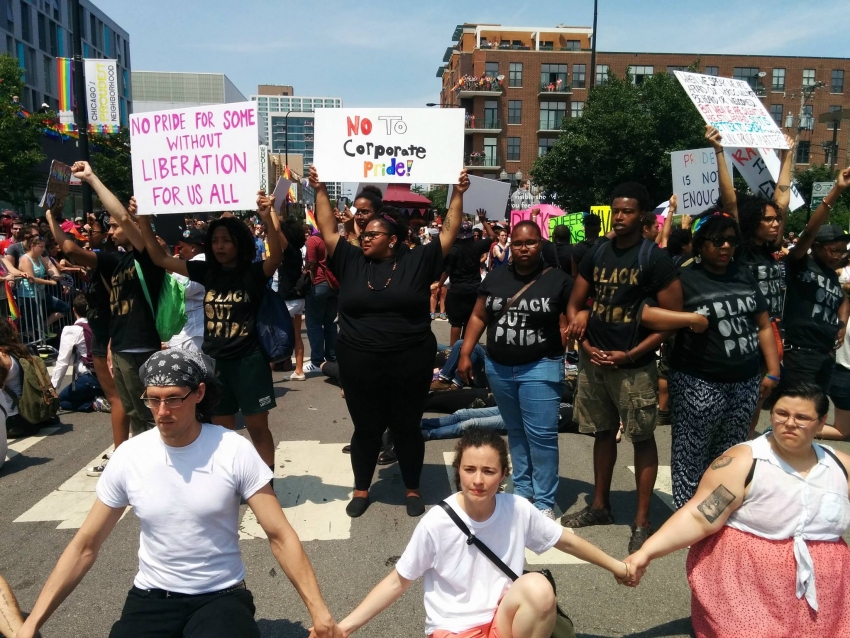
IB: So, similarly, what drew you–I think you touch on it as you spoke about learning more about the archives. But, can you say specifically what drew you to organizing and activism in Chicago? And, how does it nourish you?
EG: I was drawn to organizing simply because I was inspired and empowered by the folks that I saw putting their bodies on the line for freedom. There was a BlackOut Pride event here. There were actions and events around the murder of Rekia Boyd. There was just so many things that were happening that really drew me in. And, I started attending marches and rallies and that was my foray into the activism community in Chicago. Part of organizing or getting involved in organizing and activism was also about trying to find queer community. And, queer community that really spoke to me. Not just queer community that–not that there’s anything wrong with having fun and celebrating yourself–especially as queer and trans people. I think we absolutely should. But, I also wanted to find a place where I could be in community and learn—really learn—about this community that I wasn’t really a part of until my mid-to-late thirties. So, yeah, that’s initially what drew me in — being so inspired by what I saw and wanting to be a part of that and also wanting to find queer community.
IB: Cool. So, How do your archiving skills and knowledge intersect with organizing–if at all?
EG: I think that there are certainly some intersections. There are things I’ve been trained to know and that I want to pass on to folks. I’m good at researching, I have a little bit of knowledge about ways to think about privacy and trying to avoid surveillance. So, I think that’s some of the skills that sort of intersect.
IB: In your work, what topics, issues, or historical moments most interest you? Why?
EG: In archiving, there are some theory and praxis that are very dear to me that sort of informs how I go about my archiving work. One of them is called “Survivor Center Post-Custodial Archiving Model.”
One good example of this is the University of Texas at Austin’s Human Rights Documentation Initiative. Essentially, they partner around the world with folks who have gone through some sort of horrible atrocity and who are now trying to build some sort of archive around what happened. The folks at UT for a long time worked with the Rwandan Genocide Memorial in Kigali which is a remembrance, burial place, archive, and a community space in Kigali, Rwanda that talks about the genocide that happened in 1994.
UT did not take control over what was in the archive–they didn’t fly to Rwanda and take all the stuff back to the University of Texas. They helped and, in many ways sort of silently, facilitated the physical building and infrastructure building of this archive in Rwanda. They did things like—when the archive first opened, Rwanda didn’t have the technological infrastructure to support a complex website. So, the website for the Genocide Memorial was hosted in Texas. But, they did that silently. Once Rwanda’s infrastructure caught up, they were able to host it in Rwanda. But, things like that–not taking credit for things and really just trying to be a partner to folks who are trying to build their own archive. That’s exactly the kind of work that I want to be doing, even if I’m not doing it now.
So, I just think that the Survivor Center Post-Custodial Model, any sort of Human Rights archiving, is what I’m very interested in.
Video: In March, Erin Glasco and Debbie Southorn, of the #NoCopAcademy campaign, filed a Freedom Of Information Act lawsuit against the Mayor’s Office for refusing to disclose crucial emails and records regarding the early planning for the proposed $95 Million new police academy. They are represented by attorneys with the People’s Law Office, the full complaint can be viewed here. Video is of Erin Glasco announcing her lawsuit against the Mayor’s Office on behalf of the #NoCopAcademy campaign. (read more here)
That’s why I’m involved in the No Cop Academy, because I actually think–and I’m not the first person to have made this discharge—but, leaving people without healthcare, without adequate access to food, and over-policing them in a militarized way is overly violent and horrible. And, we see vestiges of that in Chicago, that is a human rights abuse. It is. So, I think that my work with No Cop actually has–it might look different than what people are doing at UT or people in Rwanda are doing in their own archive–but, it’s still documenting human rights abuses. When I do research on alderpersons who always side with a really violent, white supremacist, hetero-patriarchal government that we have here, that’s a human rights abuse. You’re allowing people to go without food. You’re allowing people to go without adequate schooling. And we know enough now to know what happens when folks are thrown away or disregarded. So, that is sort of where my passion and my career in those topics really lies.
IB: So, that kinda goes into my next question. You know, academic archives have always felt closed off and kinda isolated spaces where only the elites or academics or researchers had access to. But, I feel like that’s shifting slowly. I feel like a lot of archivists with a social justice lens are seeing the value in community-based projects, participatory and pop-up archives which are largely volunteer-driven. Why do you think this shift is happening? And, what are the affordances of this shift?
EG: Once you realize how much archives and archivists heavily influence the writing and telling of history, which also means they also heavily influence what goes into history books. So, we have a huge role. And, once you realize that and really problematize that and think about it critically, I think it’s natural to say: “I want to try to create things outside of this really fucked up framework that exists and that is so harmful to archivists who work in these spaces.” I think it’s natural that, as we’re in this moment of upheaval, that we will also see that in archives. Because archives are a reflection in how we’re talking about ourselves, how honest we’re being, what we’re omitting, who we’re omitting. Yeah, so I think it’s really wonderful that there are so many people that are doing these community-based projects and really thinking about the role of the public and users and archivists in a really different and refreshing way.
IB: What are the challenges of this shift?
EG: Well, there are a lot of archives that exist in institutional spaces–that are still in colleges and universities. Like, so that’s a big challenge. There’s still a lot of information, lives, and archives that shouldn’t be–there are black queer things that are still in archives that don’t really support that kind of narrative. I was really surprised Octavia Butler put her papers in Huntington Library, which is a library that’s very closed. So, there are still a lot of things that people don’t have ready access to and they’re not readily available. But, what it affords is people to reimagine archives in ways that are really beautiful and dope and take away this sort of feeling like you have to be a “professional” to get into this work. You do not have to be. There are archivists all around us.
I think there are a lot of ways for people to get involved in archives in ways they haven’t before, and to see themselves and their history and to feel they have control over the narrative that they want to put out there. Because people have the right to reveal as much or as little as they want about themselves, about their legacies, and what they’ve been involved in. It’s a really exciting time and I hope that we continue on this trajectory of thinking more critically even in institutional space on how to be more welcoming and open. I think that’s still important for those like myself who are employed at institutions of higher learning, in particular, to really push the narrative to allow more people to have access to the archives, to do more outreach to let people know what we have.
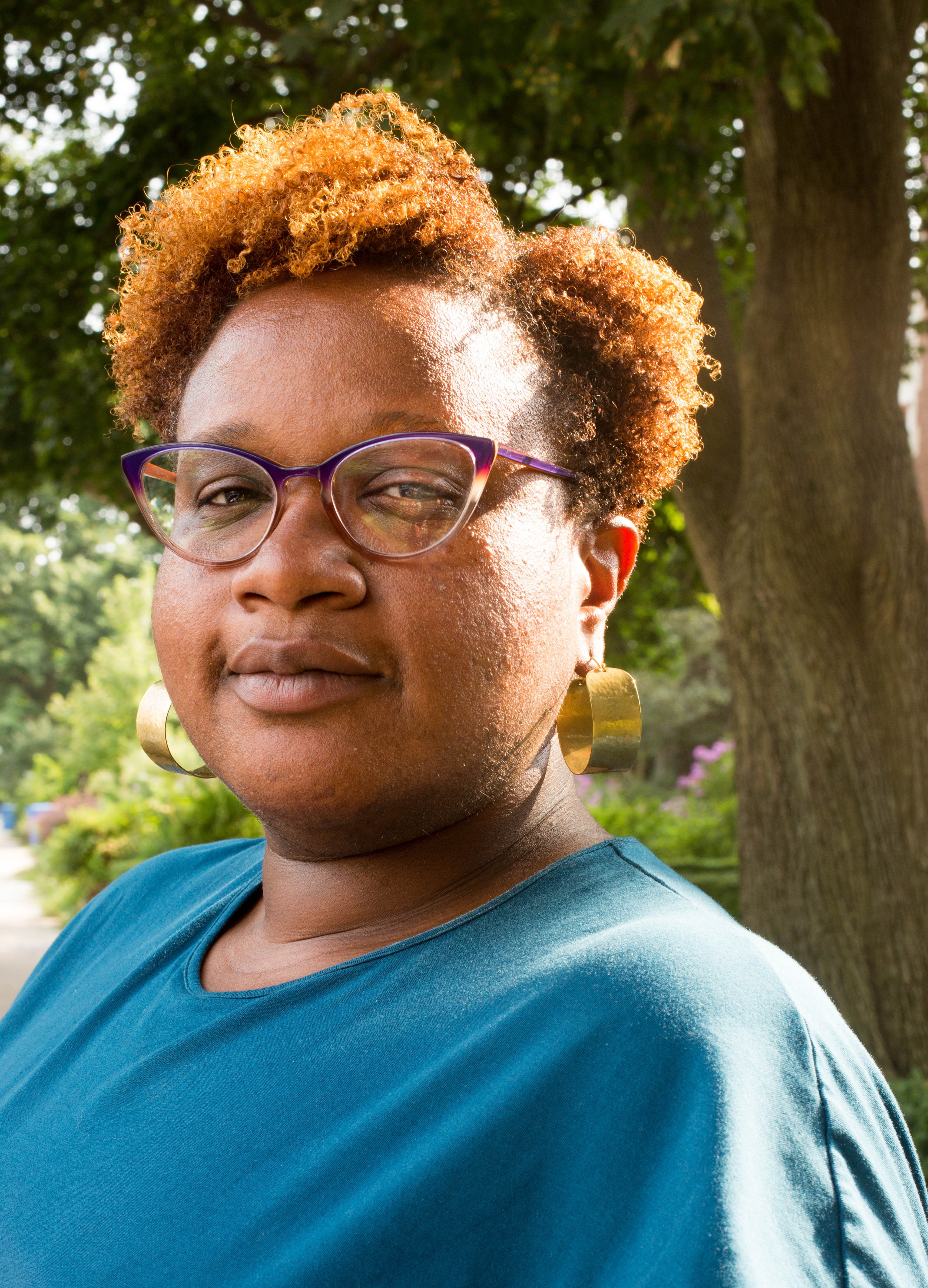
IB: In the article “Archivists on Archives and Social Justice,” authors Kimberly Belmonte and Susan Opotow position archivists as “knowledgeable stewards of history whose work shapes our understanding of the past.” What is the role and responsibility of archivists in this current socio-political and historical moment?
EG: We need to first concern ourselves with dismantling what we were taught about history, memory, professionalism, and what it means to be an archivist who gets to be an archivist. And, we have to have the understanding that many archives and museums and stewards of information of our society have been very, very hostile and violent to marginalized communities. Librarianship, in general, is overwhelmingly white and overwhelmingly white women. So, all of those things are things archivists should be contending with, first, before they go out and dictate what should be happening or what should be kept politically or historically.
And then, I think our role really has to do [with] really trying to partner with community in ways that are meaningful and acknowledge the power differential, and talk about that and do what is possible to dismantle it. Clearly, we should be documenting–there’s a lot going on in terms of social movements and political movements. We’re talking about things in a way that we never have before, so I think there is a lot of responsibility around a lot of different movements and people and places. There’s an immense number of things I think we should be doing. And, that looks different.
Like, Documenting the Now is an initiative that fosters the ethical capturing of social media and it allows people to think of their work in a different way. So, like…you may want to capture some tweets about an action for an archive that’s talking about social justice. But, if you’re capturing tweets and they are surveillance agencies, police, and FBI that know that you are, and after those tweets have been deleted they can use items from your archives to prosecute people, for instance. That’s what Documenting the Now is contending with: How are we ethically capturing things we need for archival purposes that are on the web [and] do it in a way that is ethical and doesn’t put the people who are putting their bodies on the line at risk? But, I think, first and foremost we have to be careful and acknowledge the ways in which white supremacy informs archives even now and how that can be harmful to communities we interact with. “Community Archives” is a buzzword but some of these motherfuckers don’t need to be in community. It’s not for everybody. And, if you have not done that introspection if you’re on some Savior bullshit that’s harmful. You’re bringing your institutional culture to a culture that’s not built around that.
IB: What are (contemporary or historical) examples of archivists using institutional spaces to capture and preserve societal shifts and trajectories of a social movement or moment?
EG: Lesbian Herstory Archive; People’s Archive of Police Violence; Human Rights Documentation Initiative at UT; Human Rights Archive at Duke; Librarians and Archivists with Palestine. I’m sure there are a lot more, but those are the ones that come to mind.
IB: What social and political moments from our era will people remember 50-60 years from now?
EG: So many! Like, all of them. The movement for Black Lives; The Water Protectors at Standing Rock; people talking about disabilities and body and fat justice; the Palestinian Movements for Liberation; what’s happening around immigration and people getting deported here, so not just Latinx folks but other people across the world who are getting deported for being not white, basically; queer movements for liberation; the ways that Black trans women, in particular, have organized to try to keep themselves safe. I feel like I’m forgetting a whole bunch of stuff. But, I think right now–even the Women’s March. There’s a lot that’s been going on! It’s sort of mind-blowing. There’s probably more, but I think this is a really challenging moment, don’t get me wrong. These are rough times but this is also sort of invigorating in the breadth and scope of the push-back. It’s mind-blowing how much is going on currently.
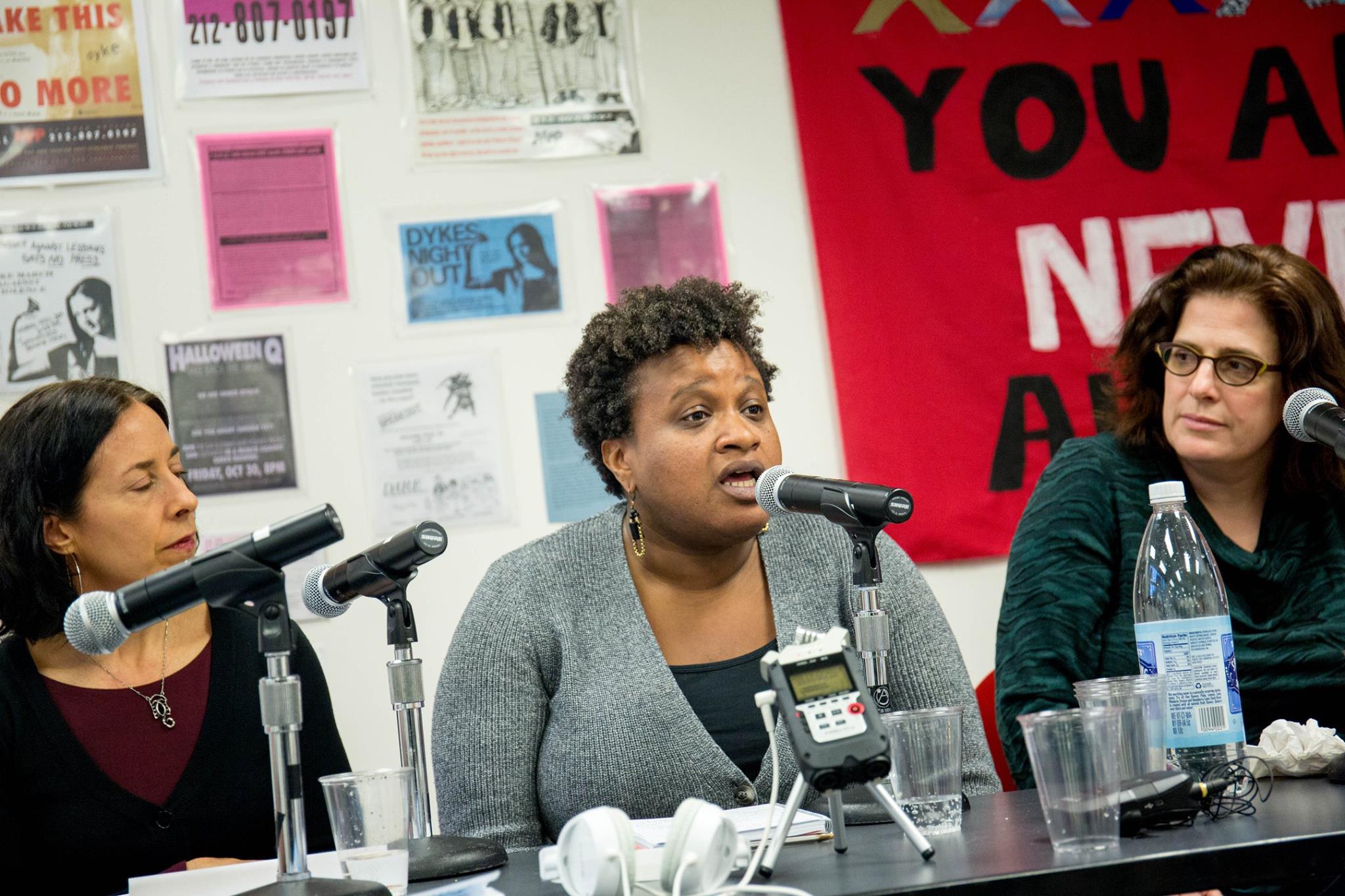
IB: In the article “Black Lives and Justice with the Archive: A Call to Action,” authors Angela J. Aguayo, Danette Pugh Patton, and Molly Bandonis write: “Representation in the archive is essential and necessary but from whose perspective representation emerges must be a question on the table for understanding archiving as a practice for social change.” What are your thoughts on representation in the archives? And whose voices, stories, and documents, etc. do you want to see represented more in the archives?
EG: While I think representation is important, I don’t want to see an archive full of middle-class Black folks. I think it’s easy, even in an archival sense, to only pull from the community’s “best and brightest.” I mean, that might be appropriate in some contexts but we need to think about representation in a more complex way. Where are the stories of folks who were under-valued by a certain class of folks but who had a vibrant community? I think of sex-workers all the time–people have ostracized them for their choice of work, but they have their own vibrant communities and movements for liberations in ways where they just loved each other and supported each other. Where is that represented in the archive?
Representation is important but it shouldn’t be, like, just to be there–just to say that “We have Black people in the archive.” If you’re a Black person or a Latinx person or a Queer person that is still pushing these same narratives around professionalism and who’s allowed in the field…. Yeah, you’re a person of color or from a marginalized group but you’re still very much about pushing things under white supremacy. We don’t want to have a monolithic voice in the archive–even if it’s more representative.
IB: Whose voices, stories, or materials do you want to be represented more in the archives?
EG: Definitely folks that are considered on the margins of our society, if they want to be, right? There are so many demographics that are seen in these ways that are really reductive. It would be really lovely to see how they see themselves, as much as they want. Consent is something that we don’t talk about a lot in archives, but as much as they want others to have access to this. Or, even for themselves, right?
I can see someone building an archive and keeping it for their own community’s history and pride. Especially if there’s thought that people from the outside world won’t understand. I would love to see marginalized people take control of archives and make them what they want them to be. I just think that it makes our documentary record more robust when we have more inclusion from more voices. Especially voices who are suffering in front of this horrible system.
IB: Well, that’s all the questions I have. Do you have anything else you would like to add?
EG: I’ve been really fortunate to be around a lot of archivists I’ve learned quite a bit from and, I’d like to name them. A lot of the things I’m talking about today were certainly formed either in-part by words that they said or from me thinking about things they’ve said. So. Jarrett Drake, Michelle Caswell, Stacie Williams, Bergis Jules, Tonya Sutherland, Rachel Winston, Joyce Gabiola, Raquel Flores-Clemons, April Hathcock, Itza Carbajal, T-Kay Sangwand, Chido Muchemwa. Just to name a few or folks that I either know personally and we’ve had some conversations or they’ve published something that I thought was brilliant and thought-provoking or they’re archival friends that I look up to. I’m thankful to have community in archives that is so inspiring and that really is trying to push for real change.
This article is published as part of Envisioning Justice, a 19-month initiative presented by Illinois Humanities that looks into how Chicagoans and Chicago artists respond to the the impact of incarceration in local communities and how the arts and humanities are used to devise strategies for lessening this impact.
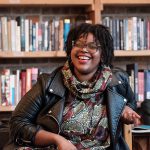
About the author & photographer: Ireashia Bennett is a Chicago-based self-taught photographer, filmmaker, writer, and multimedia artist originally from PG County, MD.
